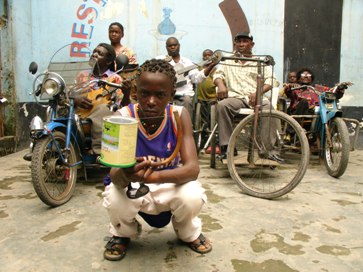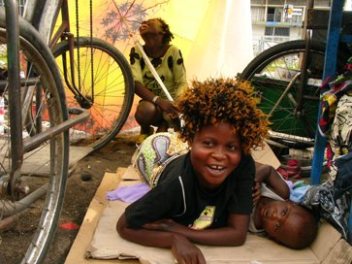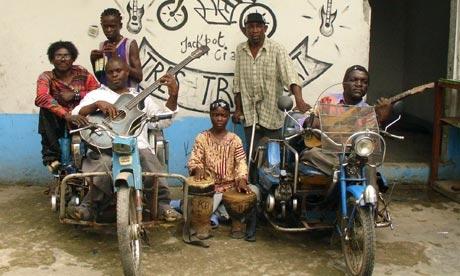On first hearing about Staff Benda Bilili - a Congolese band partly made up of paraplegics – I felt a little uneasy at the prospect of reviewing them. The last thing that one wants as a (hopefully) trusted critic is to feel compromised by an obligation to either give a positive review, or feel guilty about lessening their chances of bettering their circumstances with a bad review. Yes, rather embarrassingly, the vanity and solipsism of your reviewer has no limits.
But this visual treat of a film wastes no time in informing us that there is no room for pity in the story of this resilient collective of musicians who, rather than just having a will to succeed, seemed to have an endearingly cocksure confidence that success was their destiny (despite the fact that half the band’s members had already lived beyond the average Congolese life expectancy of 45). We first meet these remarkable men in Kinshasa in 2004, busking on the pavement outside a restaurant. One guitarist has only a bottom E string on his instrument yet is able to knock out a rousing “Louie Louie”-style riff while other band members slapped out a vigorous rhythm with flip-flops on the dusty ground. Initial scepticism of French directors Renaud Barret and Florent de la Tullaye presumably turned quickly to trust or acceptance, because what have you got to lose when you’ve got next to nothing in the first place?
Fortunately this trust was well placed, as the two French film-makers paid for the recording of the band’s debut album, and document their lives for the next five years, showing them as, by turns, resourceful, charming, tough and funny. The rags-to-riches story (or flattened-cardboard-boxes-to-mattresses story, in SBB’s case) of past world-music acts has sometimes threatened to overshadow or distort perceptions of their actual musical merit. For example, although the Buena Vista Social Club were unquestionably a fine band, would they have really been as internationally successful, and remained so for as long as they have, if it hadn’t been for Wim Wenders’s award-winning movie?
 Already critics have compared the two films, but the similarities are fairly superficial. For one thing, SBB really, really rock. This is apparent from the earliest raw field recordings made during rehearsals in the grounds of Kinshasa zoo, right up to the scorching performance on a big stage in front of an initially sparse audience at the famous Belfort Eurockeennes Festival in France at the film’s climax. One can’t help but share the band’s growing excitement as more and more people get drawn towards the stage, perhaps by the clarion call of the humble little homemade instrument created by Roger Landu, the band’s youngest member.
Already critics have compared the two films, but the similarities are fairly superficial. For one thing, SBB really, really rock. This is apparent from the earliest raw field recordings made during rehearsals in the grounds of Kinshasa zoo, right up to the scorching performance on a big stage in front of an initially sparse audience at the famous Belfort Eurockeennes Festival in France at the film’s climax. One can’t help but share the band’s growing excitement as more and more people get drawn towards the stage, perhaps by the clarion call of the humble little homemade instrument created by Roger Landu, the band’s youngest member.
Landu is really the star of this film (and in some ways the band too). Even though SBB were already producing a unique mix of Cuban mambo, Congolese rumba and fierce American funk prior to Landu joining them, we see that as soon as he began to tentatively pluck at his one-stringed old tin can instrument, it represents a new beginning for the band. Throughout the film’s 85 minutes Landu grows from a shy 13-year-old into both a confident human being and a thrillingly accomplished musician. At one point he says, “I’ll do great things with this instrument,” and you don’t doubt him for a moment. And so by the time the band are touring internationally, following the album’s success, he has fully metamorphosed into the splendid butterfly that is the true guitar hero, throwing himself around the stage, his humble little instrument now plugged into an effects pedal for added rock sustain.
 While all this is going on, the directors manage somehow also to make this documentary a thrilling visual treat, even if part of our cinematic pleasure derives from how grittily picturesque poverty can look (pictured left) when captured by a good cinematographer. There’s not a single frame that doesn’t hold the attention, from unnerving shots of Congolese boys risking life and limb to jump aboard a speeding train, to the paraplegic football match in which the two teams raise clouds of dust scrambling and skittering across a grassless pitch. My one gripe is not about the film but about its promotion. Was it really necessary or even useful to begin the publicity blurb with the clichéd, inaccurate words, “The feel-good movie event of the year”? Oh well, if a million Mamma Mia! fans end up going to see it thanks to such misleading hyperbole, perhaps it will have been justified.
While all this is going on, the directors manage somehow also to make this documentary a thrilling visual treat, even if part of our cinematic pleasure derives from how grittily picturesque poverty can look (pictured left) when captured by a good cinematographer. There’s not a single frame that doesn’t hold the attention, from unnerving shots of Congolese boys risking life and limb to jump aboard a speeding train, to the paraplegic football match in which the two teams raise clouds of dust scrambling and skittering across a grassless pitch. My one gripe is not about the film but about its promotion. Was it really necessary or even useful to begin the publicity blurb with the clichéd, inaccurate words, “The feel-good movie event of the year”? Oh well, if a million Mamma Mia! fans end up going to see it thanks to such misleading hyperbole, perhaps it will have been justified.
Watch the trailer to Benda Bilili!















Add comment